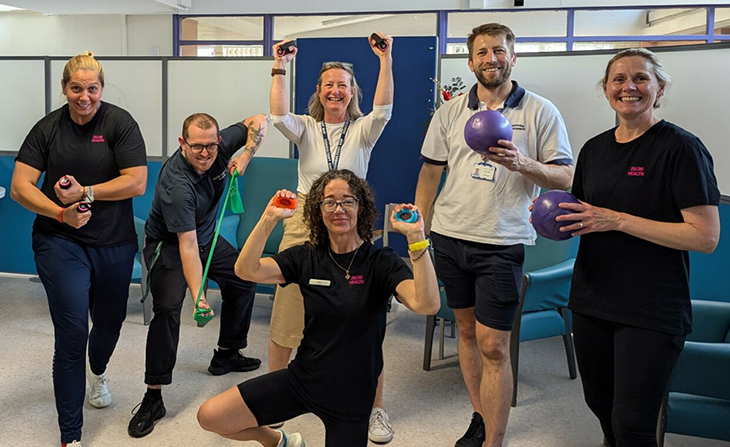East Sussex Healthcare NHS Trust and Active Sussex have joined forces to keep stroke patients moving to improve their health while at hospital and when they go home.

A stroke diagnosis can have a significant impact on people, including their ability to walk and move, to eat and to communicate. Recovering from a stroke is often a long and complicated process that requires support from a range of clinical and therapeutic staff.
This process can be made more difficult when patients experience ‘deconditioning’. Deconditioning is when people lose muscle mass due to long periods of physical inactivity – such as being in a hospital bed – which can make them more frail and unwell both physically and mentally, and make it harder for them to return home and to their previous activities.
This can be particularly challenging for patients who are recovering from the longer term impacts of their stroke.
To fight back against deconditioning, a new partnership has been created between East Sussex Healthcare NHS Trust, who deliver stroke rehabilitation for the NHS in East Sussex, and Active Sussex, who are the strategic leads in increasing physical activity for people across Sussex. The project, which will run until December this year, is also supported by 20/20 Health and Active Rother.
Active Sussex Health Instructors, provided by 20/20 Health, will work alongside East Sussex Healthcare NHS Trust physiotherapists and support workers to support patient stroke rehabilitation at the Bexhill Irvine Unit. They will focus specifically on the challenges posed by deconditioning in hospital, helping patients to spend time out of bed and increase their physical activity encouraging participation in exercise groups.
After the patients’ stay at the rehabilitation unit, the Health Instructors will then continue to work with the patients’ in their own homes after they have been discharged, encouraging them to build the habit of staying active as part of their ongoing recovery from their stroke and helping them to get involved in physical activities in their local area on a long-term basis.
Karen Poole, Allied Health Professional Rehabilitation Consultant at East Sussex Healthcare NHS Trust, said: “Older people who are hospitalised are at significant risk of deconditioning, which can make returning to their previous lifestyle more challenging.
“This unique project will test out the impact of delivering additional activity sessions in an inpatient unit to reduce the risk of harm from deconditioning and enhance the opportunity for older people to participate in activity sessions on returning home.
“This project uses a novel workforce of community exercise instructors working alongside healthcare staff in the Irvine unit and will follow the person through their inpatient stay and into the community.
“Through the community activity group offer we hope to build on and sustain that engagement in building long-term activity habits for older people.”
Ross Joannides, the strategic relationship manager for older people at Active Sussex, said: “Active Sussex is extremely excited to be involved in a pilot that will see the NHS, local authority and the voluntary sector working in partnership to support those at risk of deconditioning in the hospital setting.
“Health instructors will work alongside physiotherapists and other healthcare staff to support patients’ recovery and the transition into appropriate community settings where they can continue their rehabilitation.
“At the heart of this is the patient who will be consulted throughout their pathway to recovery.
“There is a desire through this project to change the way the system addresses deconditioning in older people with long-term health conditions in hospital settings across Sussex.
“It’s also a fantastic opportunity to show the impact of real co-design and collaboration between local NHS services and its partners to achieve greater health outcomes for local residents.”
Deconditioning and stroke – the facts
- Deconditioning contributed to delayed discharge in more than 47% of older patients.
- Many older patients who were walking independently two weeks prior to admission needed help to walk when they left hospital.
- Patients spend up to 83% of their time in bed, and 12% in a chair.
- Hospitalised patients are 61 times more likely to develop disability in activity daily living (ADL) than those not hospitalised.
- Up to 50% of older people become incontinent within 48 hours of admission.
- 50% of patients experience functional decline between admission and discharge.
Stroke remains a leading cause of long-term disability in England. Consequently, stroke survivors are often deconditioned and predisposed to a sedentary lifestyle that adversely impacts performance of activities of daily living, increases the risk for falls, and may contribute to a heightened risk for recurrent stroke and other cardiovascular (CV) diseases.
